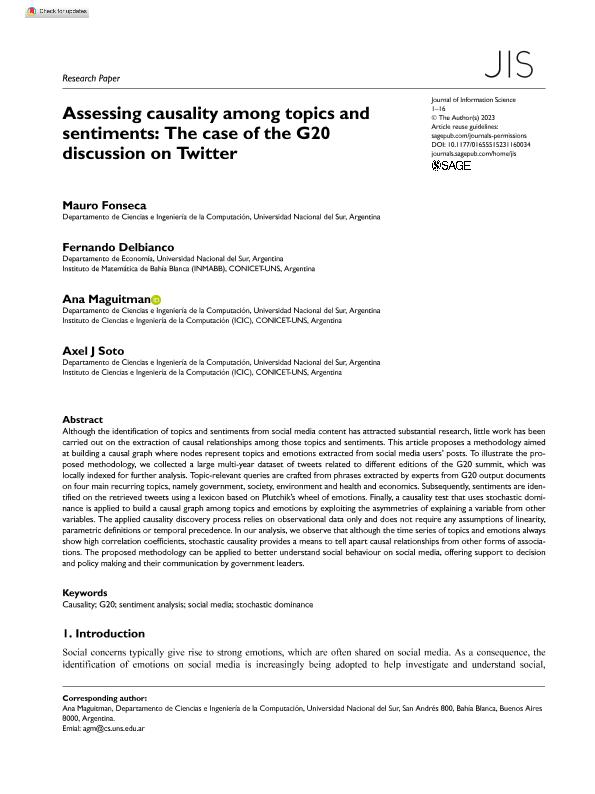Artículo
Assessing causality among topics and sentiments: The case of the G20 discussion on Twitter
Fecha de publicación:
30/03/2023
Editorial:
Sage Publications Ltd
Revista:
Journal Of Information Science
ISSN:
0165-5515
e-ISSN:
1741-6485
Idioma:
Inglés
Tipo de recurso:
Artículo publicado
Clasificación temática:
Resumen
Although the identification of topics and sentiments from social media content has attracted substantial research, little work has been carried out on the extraction of causal relationships among those topics and sentiments. This article proposes a methodology aimed at building a causal graph where nodes represent topics and emotions extracted from social media users? posts. To illustrate the proposed methodology, we collected a large multi-year dataset of tweets related to different editions of the G20 summit, which was locally indexed for further analysis. Topic-relevant queries are crafted from phrases extracted by experts from G20 output documents on four main recurring topics, namely government, society, environment and health and economics. Subsequently, sentiments are identified on the retrieved tweets using a lexicon based on Plutchik?s wheel of emotions. Finally, a causality test that uses stochastic dominance is applied to build a causal graph among topics and emotions by exploiting the asymmetries of explaining a variable from other variables. The applied causality discovery process relies on observational data only and does not require any assumptions of linearity, parametric definitions or temporal precedence. In our analysis, we observe that although the time series of topics and emotions always show high correlation coefficients, stochastic causality provides a means to tell apart causal relationships from other forms of associations. The proposed methodology can be applied to better understand social behaviour on social media, offering support to decision and policy making and their communication by government leaders.
Palabras clave:
CASUALITY
,
G20
,
SENTIMENT ANALYSIS
,
SOCIAL MEDIA
,
STOCHASTIC DOMINACE
Archivos asociados
Licencia
Identificadores
Colecciones
Articulos(INMABB)
Articulos de INST.DE MATEMATICA BAHIA BLANCA (I)
Articulos de INST.DE MATEMATICA BAHIA BLANCA (I)
Citación
Fonseca, Mauro; Delbianco, Fernando Andrés; Maguitman, Ana Gabriela; Soto, Axel Juan; Assessing causality among topics and sentiments: The case of the G20 discussion on Twitter; Sage Publications Ltd; Journal Of Information Science; 30-3-2023; 1-16
Compartir
Altmétricas




